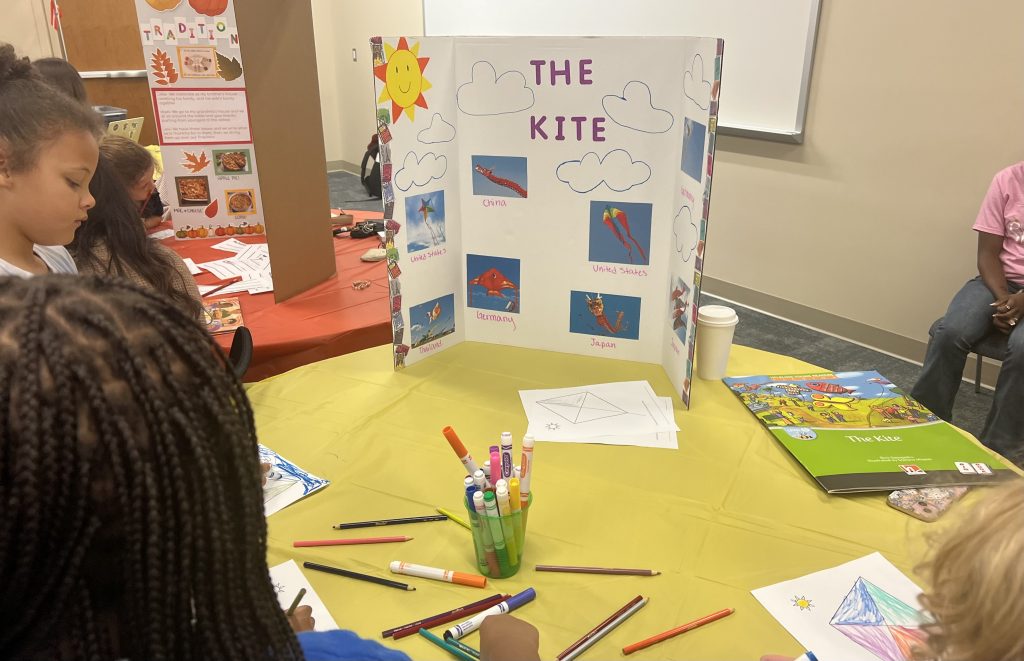
Bradley’s International Education Month festivities came to a close on the morning of Nov. 21 in Westlake Hall with balloons, inflatable mascots, activity tables and a puppet show. The audience of young elementary students left with goodie bags and knowledge of the world in their hands.
Students first entered the room with assigned stations hosted by Bradley education majors and took part in activities. While the tasks varied from coloring to crafting, each board highlighted a different country with a children’s book summary at the center.
For the Department of Education and the Office of Global Studies (OGS), it was a collaboration of missions: literacy and global education, and the focus on books with diverse stories melded the two objectives into a comprehensive experience.
With a variety of activities and preparation, it may have seemed to be a Bradley staple event. However, the director of OGS, Jeanie Bukowski, noted otherwise.
“[OGS] started out doing things like lectures for college-age [students] and the public,” Bukowski recounted. “[Juan Rios] has been doing the literacy event, usually in the spring, for a long time. But we decided … to do an event where we target our international students or students who are of origin from someplace else, to participate and celebrate, because that’s something we need to get across in terms of global education.”
Since the establishment of the OGS at Bradley in 2021, the mission has stayed the same, but for the education department, the goal has been refined. A shift to more focused objectives, such as global awareness, was influenced in part by Juan Rios, an associate professor in the education department.
“Besides being a professor, I’m also a writer scholar. I wrote quite a few children’s stories, and I was lucky to find a book editor to read my first story, ‘Carlos the Fairy Boy,’ and she liked it and she wanted me to be an illustrator,” Rios explained. “Since then, I haven’t stopped.”
With the range of children’s books on the shelves, Rios’ stood out for the identity and purpose behind them.
“I think being a person like me – an immigrant, a man of color, an English learner – in having experiences in society with not fitting in also allows me to write stories that you will rarely read about from a children’s lens,” Rios said.
“We have a lot of kiddos in our schools who see themselves in those characters. We call them mirror books,” the professor clarified.
It was no coincidence that the girl at the center of the puppet show was a character in one of those books, as Rios explained.
“It’s about an Afro-Latina girl, and I bet a lot of our African-American kids would identify with the character,” he said.
As the children watched the show, the experience became a learning opportunity for aspiring teachers volunteering at the event. For those like sophomore early childhood education major Yahari Smith, it was a demonstration of their mission as future educators.
“I know for me, when I was in elementary school, learning was boring,” Smith said. “I want to make learning fun for my students.”
Meanwhile, volunteers at the stands found insight in their path. Sophomore art education major Madison Jecmen noted the importance of art while manning New Zealand’s kiwi bird stand.
“Arts connect the world,” Jecman said. “Every culture has a form of art, dance, music and some of the first people did cave drawings.”
While the exciting span of activities and display of the arts within global literacy may have been the highlight of the event for many, Rios hoped education majors would use it as a learning experience.
“I prepare teachers,” Rios said. “I want our student teachers to experience one of the multiple hats that teachers wear, and having events like this where students learn in a different way is extremely important because not everything has to be structured seating, taking notes, repeating.”
When reflecting on the chosen topic of international education, Rios highlighted the importance of encouraging curious minds.
“Being able to create a space to be inside themselves and to feel free to ask questions and to learn at a young age, I think it’s preparing [students] to be what we call ‘citizens of the world,’” Rios said.
